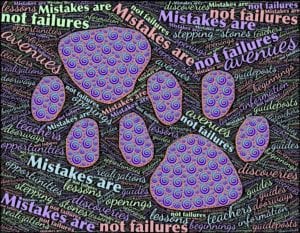
Many moons ago, I was the flute instructor at the Cazadero Performing Arts camp in Northern California for seven summers. One summer evening, a wind trio from the San Francisco Symphony came and performed at the camp. After a delightful set, the musicians of the trio stayed on stage and opened up for a Q & A. After a number of questions like "How did you get so good?" and "Is this your day job?" were asked, one young student inquired "Do you ever make a mistake?" The clarinetist of the group said frankly "All of the time." He went on to explain by describing a recent recording session of one of the San Francisco Symphony's Mahler recordings. There was a small section of just a few measures that were just "not right". So, after the whole set was done, the musicians went back into the studio and re-recorded the measures for an hour to make it sound perfect on the finished album.
The clarinetist's point was that we live in a world of recordings. Musicians, authors, actors, painters get opportunities to have a recording engineer (or editor, or studio time) create something that appears "perfect" to the audience. In return, though, the audience often forgets that the artist is human and thus has developed an expectation for perfection at every performance (book release, exhibit, etc.).
This overwhelming expectation can have negative results. As a life-long classical musician, I strive for perfection in all I do and kick myself when it doesn't happen. Even in the new administrative career I have, I am devastated when I make a silly mistake or something doesn't go right. However, I learned a mantra a long time ago when I started using the famous English flutist's, Trevor Wye, books on tone and technique. In these books he has one sentence which is repeated over and over throughout the pages. After the sentence is first noted it is then scattered throughout the book, but the four main words are left blank for the student to fill in as they explore each page. The sentence is "It is a question of TIME, PATIENCE, and INTELLIGENT WORK."
It is often difficult for many of us, whether we are an artist or an administrator, to let mistakes go and realize they are opportunities to learn from and grow. But as someone who has spent time in the trenches on both the stage and in the office, I hope that when you go to your next concert, meeting, read a book, explore an artist's exhibit, or even listen to your favorite recording, you can remember that in all things it is a question of _______, ____________, and ______________ _____________.